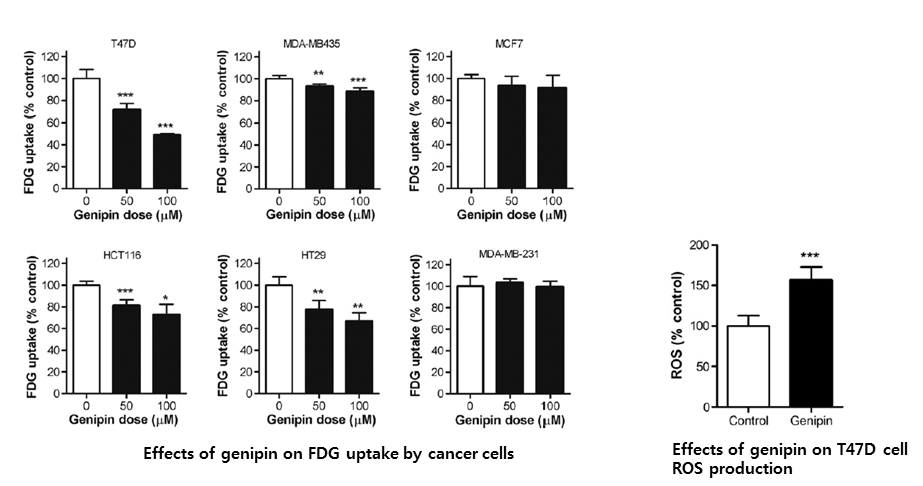글로벌 연구동향
핵의학
![[Nucl Med Biol] Molecular mechanism of (18)F-FDG uptake reduction induced by genipin in T47D cancer cell and role of uncoupling protein-2 in cancer cell glucose metabolism.](/enewspaper/upimages/admin_20161108152535_R.bmp) 2016년 11월호
2016년 11월호
[Nucl Med Biol] Molecular mechanism of (18)F-FDG uptake reduction induced by genipin in T47D cancer cell and role of uncoupling protein-2 in cancer cell glucose metabolism.성균관의대/ 조영석,이경한*
- 출처
- Nucl Med Biol
- 등재일
- 2016 Oct
- 저널이슈번호
- 43(10):587-92. doi: 10.1016/j.nucmedbio.2016.06.001. Epub 2016 Jun 7.
- 내용

Abstract
INTRODUCTION:
Compounds that modulate cancer cell glucose metabolism could open new opportunities for antitumor therapy and for monitoring response using (18)F-FDG PET. Genipin, a natural dietary compound that blocks uncoupling protein 2 (UCP2)-mediated mitochondrial proton leakage, is a potential anticancer agent. We investigated the effect of genipin on glucose metabolism and the mitochondrial function of cancer cells.
METHODS:
Breast and colon cancer cells were assessed for effects of genipin on (18)F-FDG uptake. T47D breast cancer cells were further evaluated for time-dependent and dose-dependent effects on (18)F-FDG uptake, lactate release, oxygen consumption rate (OCR), reactive oxygen species (ROS) production, and mitochondrial membrane potential. The effects of UCP2 knockdown were evaluated using specific siRNA.
RESULTS:
Cancer cells displayed significant reductions in (18)F-FDG uptake by genipin. T47D cells showed the greatest reduction to 32.6±1.0% of controls by 250μM genipin. The effect occurred rapidly, reaching a plateau by 1h that lasted up to 24h. The effect was dose-dependent with a half-inhibitory concentration of 60.8μM. An accompanying decrease in lactate release was consistent with reduced glycolytic flux. OCR was significantly decreased by genipin to 82.2±11.4% of controls, and ROS generation was increased to 156.7±16.0%. These effects were largely reproduced by UCP2 knockdown with specific siRNA.
CONCLUSIONS:
Genipin decreased cancer cell (18)F-FDG uptake by reducing both glycolytic flux and mitochondrial oxidative respiration. This effect appeared to occur by blocking the ability of UCP2 to dissipate energy and restrict ROS production through proton leakage.
Author information
Cho YS1, Lee JH2, Jung KH2, Park JW2, Moon SH2, Choe YS2, Lee KH3.
1Department of Nuclear Medicine, Samsung Medical Center, Sungkyunkwan University School of Medicine, Seoul, Republic of Korea. Electronic address: ysnm.cho@samsung.com.
2Department of Nuclear Medicine, Samsung Medical Center, Sungkyunkwan University School of Medicine, Seoul, Republic of Korea.
3Department of Nuclear Medicine, Samsung Medical Center, Sungkyunkwan University School of Medicine, Seoul, Republic of Korea. Electronic address: khnm.lee@samsung.com.
- 키워드
- Genipin; MMP; ROS; UCP2; Uncoupling
- 연구소개
- 암세포 미토콘드리아 내에서 reactive oxygen species(ROS)를 낮추는 역할을 하는 uncoupling protein 2(UCP2)의 당대사에 대한 영향을 평가한 논문입니다. UCP2는 암세포 내의 미토콘드리아에서 에너지 축적의 의미로 만들어 놓은 proton gradient를 uncoupling이라고 불리는 현상을 통해 일시적으로 소모하여 미토콘드리아 내의 ROS를 낮추는 역할을 하는 단백질입니다. 본 연구에서는 이러한 UCP2 inhibitor인 genipin을 사용하였을 때와 사용하지 않았을 때의 FDG 섭취정도 및 각종 대사적 지표를 비교하였습니다. 연구 결과 일부 암세포의 경우 genipin으로 FDG 섭취정도를 50%이하로 감소시킬 수 있음을 확인하였습니다. 이는 UCP2가 암세포 생존을 위해 매우 많은 에너지를 사용하고 있음을 보여주며, 이러한 정보가 연구자들에게 도움이 될 것이라고 생각합니다.
- 덧글달기







